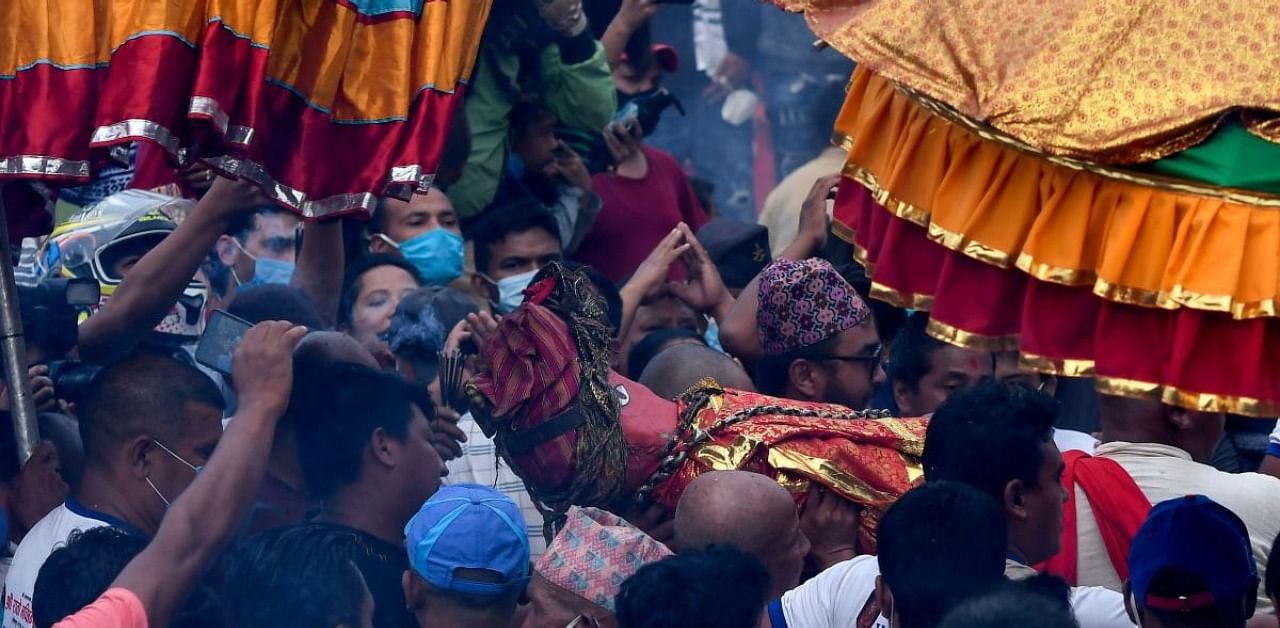
The revered living goddess is not leaving her temple this year.
The old palace courtyard packed with hundreds of thousands of people each year during the Indrajatra festival is deserted, the temples are locked and all public celebrations are banned by the government to curb the coronavirus.
Autumn is the festival season in predominantly Hindu Nepal, where religion, celebrations and rituals are big parts of lives, but people this year will have to scale down their rituals within their homes.
Many in this Himalayan nation believe they would anger the gods by shunning the rituals — which would cause a catastrophe.
Even violent clashes broke out between police and devotees defying government orders during a separate chariot festival south of Kathmandu.
A lockdown was ordered around the eight days when the cancelled Indrajatra festival would have been held, and instead, a small ceremony to seek forgiveness from Indra, the Hindu god of rain, was held under government security.
During the festival, Kumari, a girl revered as the living goddess, is taken around the core part of Kathmandu in a chariot pulled by devotees.
After the cancellation, she never left her temple palace. Her chariot is locked in the shed and armed police guard the courtyards.
“There would be hundreds of thousands of devotees crowding the courtyard and streets during the festival which would have put so many of them at the risk of getting the coronavirus,” said Kumari's chief caretaker Gautam Shakya.
“We had to stop this centuries-old festival for the first time ever.”
Shakya and his family have been taking care of Kumari for generations. A young flawless girl is chosen from a single clan and is worshipped as the living goddess until she is replaced at puberty. High officials and commoners touch her feet to get her blessing.
A small group of devotees who slipped through the lockdown and security to pray before the living goddess said they needed to continue the tradition followed by their ancestors.
“The festival and Kumari is not just a tradition, it is our culture and a big part of our lives which we just cannot stop for anything, not even for pandemic,” said Shanker Magaiya, a launderer who was able to offer flowers and sweets to the goddess.
Magaiya felt heartbroken by the cancellation, saying while they understand the government order, they needed to protect their religion, culture and tradition.
“We have disappointed the gods and we need to keep the gods happy so we all can be happy and prosper," he said.
Nepalese authorities imposed a strict coronavirus lockdown in March that was eased in July.
More than 76,000 people have been infected and 491 have died.
But the ban on outdoor festivals and religious gatherings continues and temples remain locked.
Near Kumari's temple, a huge statue of Hindu deity Swet Bhairav is opened to the public only once a year during the festival.
Devotees push each other to get a sip of the rice wine that is released from a pipe attached to the head of the statue.
This year, the doors were only cracked open and a very few people were lucky enough to sip the holy wine.